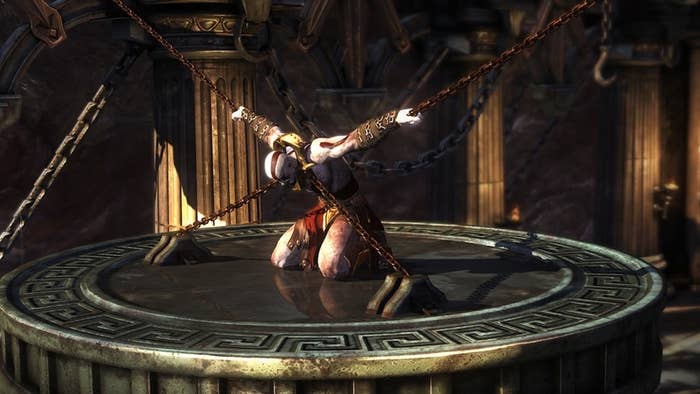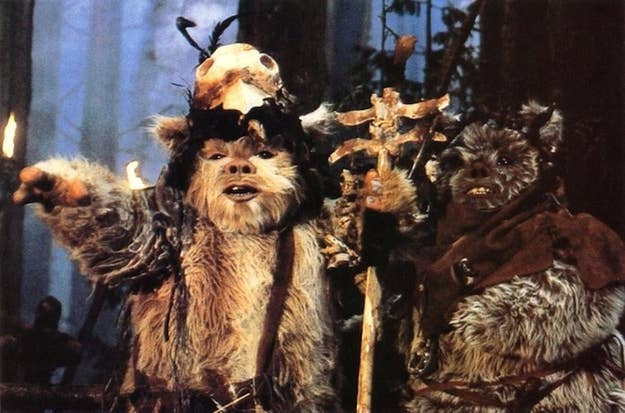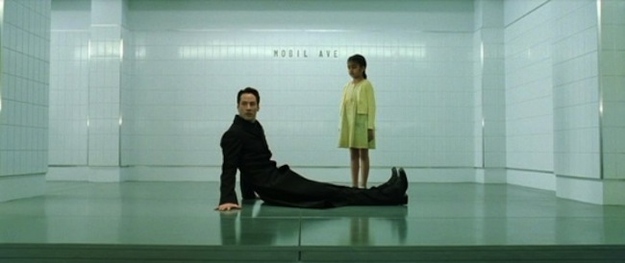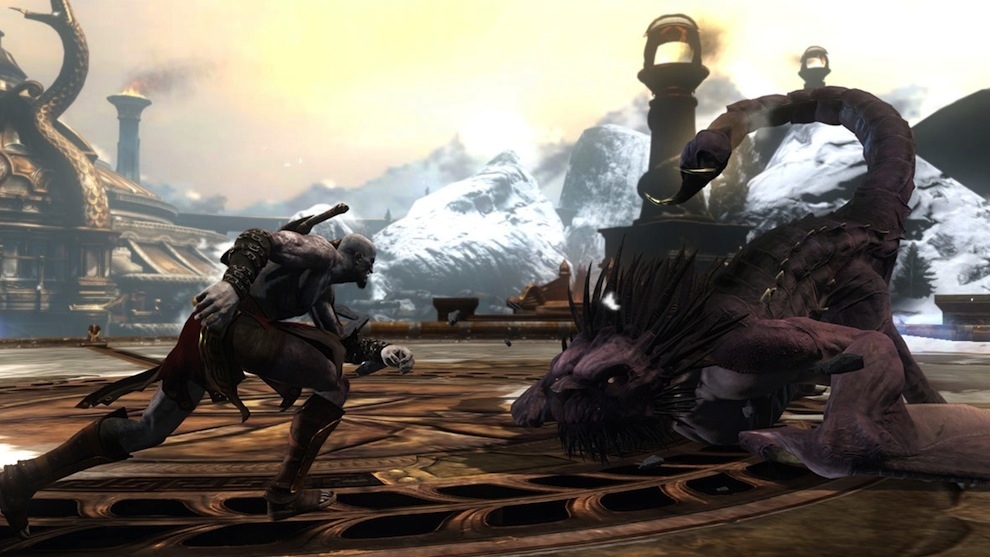
One hundred forty years after Götterdämmerung, sixty years after The Return of the King, thirty years after Return of the Jedi, and a year after Mass Effect 3, it seems fair to say that the trilogy is the basic unit of nerd narrative. Why? Beyond the basic financial incentive to create more of a healthy product, how has the number three come to so closely associate itself with popular narratives of science fiction, adventure, and fantasy?
Start with structure. The trilogy is a macro recreation of the storytelling dogma to have a beginning, a middle, and an end — an arc. Most often, in a trilogy, this takes the form of an auspicious beginning or origin (1), followed by an existential test/trial/period of hopelessness (2), followed by a final triumph (3). It's a good way to tell a story: It goes back at least two millennia, to the ancient Dionysian plays.
But there's more to it than that. In modern nerd cinema and gaming, the second movie or game is frequently the best in the trilogy, an installment that takes the themes and promises from the first act, develops and improves on them, and dispenses with what failed in the predecessor. Think of The Empire Strikes Back, The Dark Knight, Uncharted 2, Assassin's Creed 2 (and non-nerd movies, like the second Godfather). A superlative second validates the ambitions of the series and also creates enormous anticipation for a third. A great sequel can impel a trilogy.

And, as has been shown again and again, the third act in a nerd trilogy is almost never as good as the second or even the first entry. To name but a few: The Matrix Revolutions, Assassin's Creed 3, Alien 3, Dead Space 3, Spiderman 3, Fable 3 (The Godfather 3), and so on, and so on. (Before his own, somewhat disappointing third Batman movie, Christopher Nolan asked, "How many good third movies in a franchise can people name?")
The end of a nerd trilogy is frequently when the original creators divest themselves of their work. And so Nolan left Batman, Raimi left Spiderman, Cliffy B left Gears of War, Corey Barlog left God of War, Bungie left Halo. (And perhaps not coincidentally, Ray Muzyka and Greg Zeschuk left BioWare after the release of the third Mass Effect). The implication is clear: There's nothing more to be done.
Many of the game trilogies that started in the mid-aughts are over, and by this logic, should be winding down, some of them after desultory third acts. Except, in the gaming world (and increasingly in the world of nerd cinema), the idea that a series is over, or creatively exhausted, doesn't really exist. We might talk about the "main trilogy" or "canon trilogy," but what most of the series really are is intellectual property, a set of characters, locations, themes, and tropes that can be reconfigured endlessly, or at least until they stop making money. "IP" is actually the default way — not only among game creators and publishers but among fans — of talking about their favorite gaming series. That's why Ubisoft announced a new Assassin's Creed game less than half a year after releasing AC3, and why BioWare announced a new Mass Effect less than a year after ME3. Game series don't even go away long enough anymore to create nostalgia. (Except for rare exceptions, like the Half-Life trilogy, for which fans will wait, and wait, and wait.)

God of War, Sony's wonderful "IP" about a dyspeptic Spartan general named Kratos and his various tiffs with those cynics up Olympus, is one of the poster children for this phenomenon, and for this phenomenon done pretty damn well. In addition to the first three games in the series, fans of the "IP" may also play two handheld spin-offs (which are both, I might add, excellent), a mobile game; read a comic book series and two novelizations; and, if they are so inclined, listen to a metal tribute to the games entitled God of War: Blood and Metal.
The third God of War came out in 2010 and may still be the most impressive game on the PlayStation 3. It accomplished the feat of being actually un-follow-up-able. In addition to a sublime opening level that takes place on wooded crags of the titan Gaia as she ascends Mount Olympus, the game insists that you murder Poseidon, Hades, Hermes, the titan Cronos, and for the finale, Zeus (who is your father, but don't ask). In addition to finishing Kratos' story, God of War 3 simply left no gods left to rail against, unless Sony figures out a way to transport Kratos to another polytheistic universe, and as I write this I am imagining a fight between Kratos and a wrathful, tooting Ganesh and smiling widely.
It was also the best game in the trilogy, a terrific conclusion. But an IP is an IP, and Sony has chosen to make a prequel, called God of War: Ascension.

Based on the quality of the other God of War spin-offs, Ascension deserves the benefit of the doubt. And I am glad to report that the greatest thing about these games, the balletic, crackling, spectacular combat, is intact. To pick up the controller and play these games is to instantly understand the kinetic excitement that most action games strive for and which almost no action games achieve. The second-greatest thing about these games, the classical and imposing sense of proportion, is also intact. And for that matter, so is the third, which is the vocal performance of Terrence C. Carson as Kratos, and especially his range of nonverbal exclamations, and especially his grunting. (There are shades of difference so fine within the Kratos grunt that they may best be described in the vocabulary of the oenophile, as in, "undertones of earthiness" and "notes of melancholy.")
(The worst thing about the God of War games, the insistence on an early scene within a whorehouse, is also, regrettably, represented. We are often told that the baring of breasts in God of War represents the maturity of the series and of games in general. Here's an idea that would prove how mature the series really is. Display ancient Greek sexuality in all of its many configurations. Bestow Kratos a 15-year-old boy-servant and introduce a paiderastia minigame. It was, after all, the highest form of love.)
But as a narrative game, Ascension, I'm unhappy to report, feels unnecessary and weird, like being served hors d'oeuvres after dessert and coffee. The game is ostensibly an origin story for Kratos, but we don't really learn anything about the character or his motivations, just that he was a fully formed irascible psychopath several years before we first started playing him as a fully formed irascible psychopath. What this series needed was a shift in tone from the maximal to the intimate, an Odyssey to the Illiad of the first three games. Instead it's just extra, like a record of B-sides. The game, well-made as it is, suffers from the worst thing you can say about a piece of narrative: It has no reason for being. Why not just replay God of War 3?
There is an important lesson here for the developers working on the first post-trilogy Assassin's Creed and Mass Effect games. The end of the trilogy should be seen as an opportunity to do something new and different, not as an obligation to flesh out an original narrative that was probably declining in quality by the end. If nerd culture can agree on one thing other than trilogies, it's that prequels are, will be, and have always been, a bad idea. How many Greek prequels can you name?
